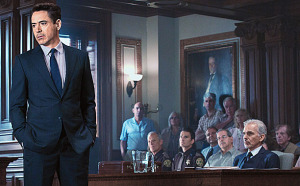How not to write a dark story – The Judge
05 Friday Dec 2014
Written by Charles Harris in Breaking The Rules, Character, Crime, Industry
The new Robert Downey Jnr, Robert Duvall movie The Judge brilliantly shows how to write a dark story of bitter relationships. Unfortunately, that’s  not all it shows.
not all it shows.
Someone decided at some point in the script’s development to sprinkle it with saccharin in case an audience might actually have an emotional reaction. So it also shows how to write two cliché-ridden, sugary subplots which almost, almost make it worth avoiding. But if you do, that would be a shame. Because in the dark side of the story there’s some great writing, acting and directing. If only that was all there was.
Need for bravery
The Judge, written by Nick Schenk and Bill Dubuque from a story by Schenk and director David Dobkin centres on Hank Palmer (Downey) a high-flying lawyer who specialises in representing guilty criminals and getting them off, and father Joseph, a highly upright, if not uptight, small-town judge who despises what his son has become. Unfortunately, Joseph is arrested for a possible hit-and-run killing of a man he once sent down, and is charged with murder – and Hank is the only one around with the experience to defend him.
So far so good. The legal scenes are sharply observed, gripping, unpredictable and morally complex. What a shame the film-makers couldn’t be so clear-sighted and brave when it came to the father-son relationship, complete with heart-tugging disease. Nor resist a totally predictable romantic interest from Vera Farmiga as the woman Hank left behind when he fled for the big city.
Ways of dealing with dark stories
There are ways of dealing with dark stories. Sometimes it’s totally right to balance a dark plot with a more uplifting subplot, but not here, where it feels the writers should be prosecuted for perjury under oath. If, as a writer or director, you set up a tone of moral complexity and hard-nosed character insights from the start, you can’t chicken out later.
Joe Eszterhas says that tone is everything in a script, and this proves his point by default. Scenes that you could get away with in a shallower movie simply stand out as dishonest in this one.
It would have been brave, but entirely possible, to write the relationship plot-lines with as much honesty and realism as the legal plot. But the opportunity was thrown away.
Watch through your fingers
Do go and see it, although be prepared to watch the subplot scenes through your fingers. Or maybe wait for the DVD so you can spin through the kitsch moments as I did with my Bafta screener. Maybe the distributors can bring out a version where you can select to play only the good scenes, rather as you can set the DVD of Memento to play in reverse order.
The sad thing is that it wouldn’t have taken much more bravery to make a really memorable, classic movie. Instead, we have a car crash in more than one sense, one which is ultimately more tragic than the makers intended.
What do you think?


Tell people what you think